|
|
|
Sort Order |
|
|
|
Items / Page
|
|
|
|
|
|
|
| Srl | Item |
| 1 |
ID:
172487


|
|
|
|
|
| Summary/Abstract |
Even though the Kim regime has been an exception, the pattern of rapid, unexpected regime collapse among hereditary autocracies indicates a need for policymakers to be prepared.
|
|
|
|
|
|
|
|
|
|
|
|
|
|
|
|
| 2 |
ID:
136702
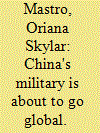

|
|
|
|
|
| Summary/Abstract |
The burgeoning need to protect commercial assets and Chinese nationals abroad will inevitably lead Beijing to develop new military capabilities and take on missions further afield.
|
|
|
|
|
|
|
|
|
|
|
|
|
|
|
|
| 3 |
ID:
162676


|
|
|
|
|
| Summary/Abstract |
Is China likely to intervene if war breaks out on the Korean Peninsula, and if so, does Beijing have the willingness and capabilities to deal safely with North Korea's nuclear program? Securing and destroying Pyongyang's nuclear weapons would be the United States’ top priority in a Korean contingency, but scholars and policymakers have not adequately accounted for the Chinese military's role in this mission. China's concerns about nuclear security and refugee flows, its expanding military capabilities to intervene, and its geopolitical competition with the United States all suggest that China is likely to intervene militarily and extensively on the Korean Peninsula if conflict erupted. In this scenario, Chinese forces would seek to gain control of North Korea's nuclear facilities and matériel. For the most part, China has the capabilities to secure, identify, and characterize North Korean nuclear facilities, though it exhibits weaknesses in weapons dismantlement and nonproliferation practices. On aggregate, however, Chinese troops on the peninsula would be beneficial for U.S. interests and regional security. Nevertheless, to mitigate the risks, the United States should work with China to coordinate their movements in potential areas of operation, share intelligence, and conduct combined nuclear security training.
|
|
|
|
|
|
|
|
|
|
|
|
|
|
|
|
| 4 |
ID:
172488
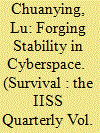

|
|
|
|
|
| Summary/Abstract |
States should focus more on shoring up cyber security and cyber services, and refrain from rejecting foreign products and investments in ways that undermine global trade.
|
|
|
|
|
|
|
|
|
|
|
|
|
|
|
|
| 5 |
ID:
159264
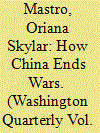

|
|
|
| 6 |
ID:
187966
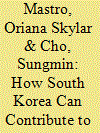

|
|
|
|
|
| Summary/Abstract |
It is rare that American strategists, scholars and government officials generally agree, but the centrality of alliances to US power is one such area. The US alliance network is considered by most to be “one of the most enduring and successful elements of US foreign policy since World War II.”1 The institutionalization of close defense relationships not only helps the United States project power globally, they also facilitate strong trade relations and the promotion of shared values in international institutions, which are the US’ comparative advantage vis-à-vis China. Unsurprisingly then, the United States has emphasized strengthening its alliance relationships to counter nefarious Chinese activities, deter Chinese aggression, and outcompete China’s attempts to revise the US-led world order. In his major speech on US policy toward China, Secretary of State Anthony Blinken summed up the Biden administration’s strategy in three words: “invest, align, compete.” Among these three verbs, “align” strongly underscores the US’ desire to closely coordinate efforts vis-à-vis China with its allies and partners.2
|
|
|
|
|
|
|
|
|
|
|
|
|
|
|
|
| 7 |
ID:
165095


|
|
|
|
|
| Summary/Abstract |
What factors do autocracies evaluate when responding to perceived threats and why might they fail to balance appropriately? I posit that autocratic leaders may choose greater exposure to an external threat if, by doing so, it preserves regime legitimacy. Specifically, the desire to promote a positive image to one’s domestic public creates incentives to publicly downplay a rival’s military progress, which then affects the state’s ability to mobilize resources to respond to the growing threat. I test this theory in the case of China’s response to India’s military rise. This research contributes to balancing theory and empirical work on East Asian security.
|
|
|
|
|
|
|
|
|
|
|
|
|
|
|
|
| 8 |
ID:
128847
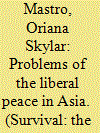

|
|
|
|
|
| Publication |
2014.
|
| Summary/Abstract |
The conviction that economic ties will engender peace is a lynchpin of US strategy, but Asian leaders view failure to protect territorial claims as worse than the losses associated with a limited war. The conviction that economic ties will engender peace in Asia has been a lynchpin of the US strategic response to a rising China for over two decades. When the US-China Relations Act of 2000 passed under President Bill Clinton, proponents of the measure argued that increased Sino-American trade would contribute to China's peaceful rise because Beijing would reject revisionism while it benefitted from the US-led world order. As one US senator commented at the time, 'the world will be a safer place - or so we hope, and so history argues'. Later, President George W. Bush described the exchange of 'many handshakes of friendship and commerce' between the American and Chinese people as enhancing understanding and therefore peace. Moreover, many of his closest advisers hoped that Chinese economic growth would eventually result in a rising middle class that would demand political freedoms and compel reform of the one-party Communist system. Most recently, President Barack Obama extolled the benefits of China's growing economic clout, declaring that 'a peaceful and stable and prosperous China is not only good for Chinese but also good for the world and for the United States'.
|
|
|
|
|
|
|
|
|
|
|
|
|
|
|
|
| 9 |
ID:
188886


|
|
|
|
|
| Summary/Abstract |
US defense strategy has long been predicated on the view that military activities, maneuvers, and deployments are credible conveyers of information to both adversaries and partners about US willingness to fight in specific circumstances. Brian Blankenship and Erik Lin-Greenberg’s article, “Trivial Tripwires? Military Capabilities and Alliance Reassurance,” makes an important contribution by demonstrating that not all military activities are created equal when it comes to reassuring allies and partners. Blankenship and Lin-Greenberg rightfully capture reassurance as a product of resolve and capability—thus a “reassuring” state can provide differing acts of reassurance depending on the degree of resolve it wishes to demonstrate and the capabilities it possesses. The authors evaluate four types of reassurance, which vary according to their strength of signaling resolve and capability: (1) tripwires; (2) fighting forces; (3) transient demonstrations; and (4) offshore presences. Relying largely on surveys of defense experts in the Baltics and Central Europe, they argue that a commitment of fighting forces—such as a permanent overseas base or a large in-country ground deployment—makes countries feel safest.
|
|
|
|
|
|
|
|
|
|
|
|
|
|
|
|
| 10 |
ID:
104332
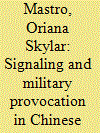

|
|
|
|
|
| Publication |
2011.
|
| Summary/Abstract |
On 8 March 2009, five Chinese vessels shadowed and aggressively maneuvered in close proximity to the US Naval Ship (USNS) Impeccable. This paper seeks to explain the incident and its aftermath in the context of Chinese coercive diplomacy. China's strategy, designed to motivate the US to cease surveillance operations near its militarily sensitive areas in the South China Sea, included three components: (1) the use of military provocation, (2) a coordinated media campaign, and (3) a challenge to US interpretations of the United Nations Convention on the Law of the Seas (UNCLOS). This study goes beyond traditional research on Chinese use of force to explain why China's coercive diplomatic campaign took the form it did. Only by understanding the nature and factors affecting Chinese coercive diplomacy can the US design the effective counter strategy needed to protect US regional and global interests.
|
|
|
|
|
|
|
|
|
|
|
|
|
|
|
|
| 11 |
ID:
179495


|
|
|
| 12 |
ID:
163755


|
|
|
|
|
| Summary/Abstract |
What factors determine how China attempts to terminate armed conflict? This article derives from the war termination literature three factors that impact the ability of disputants to resolve conflicts: approach to wartime diplomacy, views on escalation, and receptiveness to mediation. I then evaluate China’s attempts to bring conflict to a close according to these three factors in the Korean War, Sino-Indian War, and Sino-Vietnamese War. I argue that China tends to entertain talks only with weaker opponents, rely on heavy escalation to bring about peace, and leverage outside parties less as empowered mediators and more as an additional source of pressure on its enemies. A subsequent analysis of authoritative Chinese strategic writings reveal that these patterns have been imbued in contemporary thought and, therefore, are likely to persist in future flashpoints. My findings add a new dimension to the war termination literature and have policy implications for regional peace and stability.
|
|
|
|
|
|
|
|
|
|
|
|
|
|
|
|
| 13 |
ID:
157418


|
|
|
|
|
| Summary/Abstract |
U.S. officials have long agreed with Mao Zedong’s famous formulation about relations between China and North Korea: the two countries are like “lips and teeth.” Pyongyang depends heavily on Beijing for energy, food, and most of its meager trade with the outside world, and so successive U.S. administrations have tried to enlist the Chinese in their attempts to denuclearize North Korea. U.S. President Donald Trump has bought into this logic, alternately pleading for Chinese help and threatening action if China does not do more. In the same vein, policymakers have assumed that if North Korea collapsed or became embroiled in a war with the United States, China would try to support its cherished client from afar, and potentially even deploy troops along the border to prevent a refugee crisis from spilling over into China.
|
|
|
|
|
|
|
|
|
|
|
|
|
|
|
|
| 14 |
ID:
136636
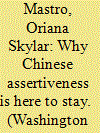

|
|
|
|
|
| Summary/Abstract |
As Chinese political, economic, and military power continues to grow at impressive rates, the impact of Chinese external behavior on the region has correspondingly increased. Since 2010, it has become commonplace for observers to refer to Chinese foreign policy behavior as abrasive, muscular, or assertive. However, China's heightened willingness to rely on coercive diplomacy—or the simultaneous use of diplomacy and limited use of force to accomplish one's objectives—began much earlier with the Impeccable incident in March 2009.1 In this case, five Chinese vessels shadowed and aggressively maneuvered in dangerously close proximity to the U.S. Naval Ship Impeccable.2 In the following months, commentators predicted that China would moderate its behavior in the face of regional backlash. Instead, instances of Chinese platforms maneuvering in a dangerous and unprofessional manner only became more frequent.
|
|
|
|
|
|
|
|
|
|
|
|
|
|
|
|
|
|
|
|
|